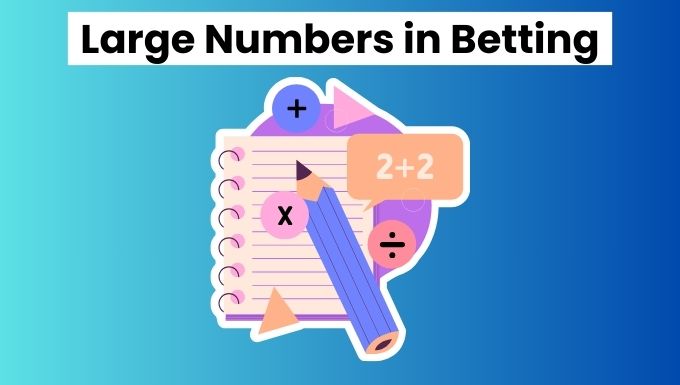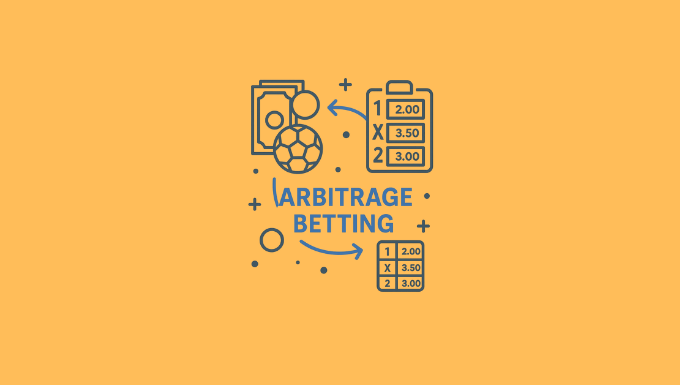As a passionate bettor,When I first started betting, I thought it was all about luck. A few wins made me feel like a genius, and a few losses made me question everything. But over time, I learned something that changed the way I bet: the law of large numbers. It’s not some complicated math concept; it’s just the idea that over time, things even out. The more bets you place, the closer your results will get to what’s expected.
Think of it like flipping a coin. If you flip it 10 times, you might get 7 heads and 3 tails. But if you flip it 1,000 times, you’ll probably get something close to 500 heads and 500 tails. Betting works the same way. Short-term results can be all over the place, but over the long run, luck balances out, and your skill (or lack of it) becomes clear.

This law is why bankroll management is so important. You need enough money to stay in the game long enough for things to even out. It’s also why finding value bets matters if you consistently bet on odds that are better than they should be, the law of large numbers will work in your favor. But if you chase losses or bet emotionally, it’ll work against you.
What The Law Of Large Numbers Actually Means
When I first heard about the law of large numbers, it sounded like some complicated math theory that only experts could understand. But once I broke it down, I realized it’s actually pretty simple and it’s one of the most important ideas in betting. Here’s how I think about it: the law of large numbers just means that the more bets you place, the closer your results will get to the expected outcome. It’s like flipping a coin. If you flip it 10 times, you might get 7 heads and 3 tails, which feels lopsided. But if you flip it 1,000 times, you’ll probably get something close to 500 heads and 500 tails. Over time, things even out.
In betting, this means that short-term results can be misleading. You might have a lucky streak and think you’re unstoppable, or a bad run and feel like you’re cursed. But the truth is, those streaks are just noise. Over hundreds or thousands of bets, luck balances out, and your true skill (or the quality of your strategy) becomes clear. That’s why I always tell people not to get too high or too low based on a few results. It’s the long game that matters.
This law also explains why bookmakers always seem to come out on top. They set odds based on probabilities, and over time, those probabilities play out. But if you can find bets where the odds are in your favor—what we call value bets—the law of large numbers works for you instead of against you. The key is patience.
Why It’s Important For Bettors
When I first got into betting, I didn’t understand why some bettors seemed to win consistently while others burned through their money. It wasn’t until I learned about the law of large numbers that things started to click. This idea that results even out over time is one of the most important concepts for any bettor to understand, and here’s why.
First, it keeps you grounded. Early on, I’d have a great weekend and think I had it all figured out, only to crash the next week. The law of large numbers reminds us that short-term results, good or bad, are just noise. Over time, luck balances out, and your long-term results will reflect your skill and strategy. It’s a reality check that keeps you from getting too high or too low.
Second, it shows why bankroll management is crucial. If results even out over time, you need enough money to survive the ups and downs. I’ve seen bettors blow their bankrolls by betting too much on a few games, not giving themselves a chance to let the law work in their favor. By betting small percentages of your bankroll, you give yourself the staying power to ride out the swings.
Finally, it highlights the importance of finding value. If you consistently bet on odds that are better than the true probability, the law of large numbers will work for you. But if you’re just guessing or chasing losses, it’ll work against you. Over time, the math doesn’t lie.
Finding Value Bets
Finding value bets is the key to making the law of large numbers work for you in betting. Without value, all you’re doing is flipping a coin against the bookmaker—and they’ve already built in a margin to make sure they win over time. So, how do you find value bets that will pay off over hundreds or thousands of bets?
Understand True Probability
• Bookmakers set odds based on both actual probability and public betting trends.
• Your job is to spot when they get it wrong—when a team or player has a better chance of winning than the odds suggest.
Look for Overpriced Odds
• If you think a team has a 60% chance of winning but the odds suggest only a 50% chance, that’s a value bet.
• Over time, consistently finding these small edges adds up.
Use Stats, Not Gut Feelings
• Short-term wins from “hunches” don’t mean much in the long run.
• Use data—expected goals, possession stats, head-to-head records, etc.—to make smarter bets.
Stick to a Strategy
• One bet doesn’t prove anything. You need a long-term approach.
• Even value bets lose sometimes, but over hundreds of bets, they’ll show profit.
Track Your Results
• If you’re not keeping track of your bets, how do you know if you’re finding value?
• Record every bet, check your ROI, and adjust your strategy as needed.
Common Mistakes To Avoid
A lot of bettors misunderstand the law of large numbers which leads to costly mistakes. Myself I’ve had a share of plenty mistakes that cost me money and taught me some hard lessons. Looking back, many of those mistakes came from not understanding how the law of large numbers works. Here are some common pitfalls I’ve seen (and made myself) that you should avoid:
- Chasing losses:
Losing streaks happen, even if you’re making good bets. Many bettors panic and increase their stake to “win it back”—this is a quick way to go broke. If your bets have value, trust that the numbers will even out over time.
The law of large numbers tells us that short-term results can be unpredictable, and trying to force a win usually makes things worse. Stick to your strategy, even when things aren’t going your way. - Overreacting to short-term results:
Winning 10 bets in a row doesn’t mean you’ve cracked the system, just like losing 10 in a row doesn’t mean you’re cursed. Short-term results don’t prove anything. You need hundreds or thousands of bets to know if you actually have an edge - Ignoring bankroll management:
Betting too much on a few games is a surefire way to blow your bankroll before the law of large numbers can work in your favor. I’ve learned to bet small percentages of my bankroll (1-2%) to stay in the game long enough to see results. - Betting without value:
Early on, I’d bet on games just because I had a “feeling” or liked a team. But without value—odds that are better than the true probability—you’re fighting an uphill battle. The law of large numbers only works in your favor if you’re consistently finding value. - Emotional betting:
Letting emotions drive your bets is a recipe for disaster. Whether it’s betting on your favorite team or chasing a big payout, emotions cloud judgment. Stay disciplined and focus on the math.
The law of large numbers is one of the biggest reasons why most bettors lose and why the smartest ones win. If you focus too much on short-term results, you’ll always be chasing wins, panicking over losses, and making emotional decisions. But if you trust the math, stay disciplined, and place enough bets with a real edge, the numbers will work in your favor over time.
The key takeaway? Stop overreacting to streaks—good or bad. A few wins don’t make you a betting genius, and a few losses don’t mean your strategy is broken. What really matters is making smart bets and giving yourself a big enough sample size for your true results to show.
This is also why bankroll management is so important. If you bet too big and go broke during a rough patch, you’ll never get the chance to let the numbers play out. But if you stay consistent, bet within your limits, and keep looking for value, you’ll put yourself in the best position to win long-term.


